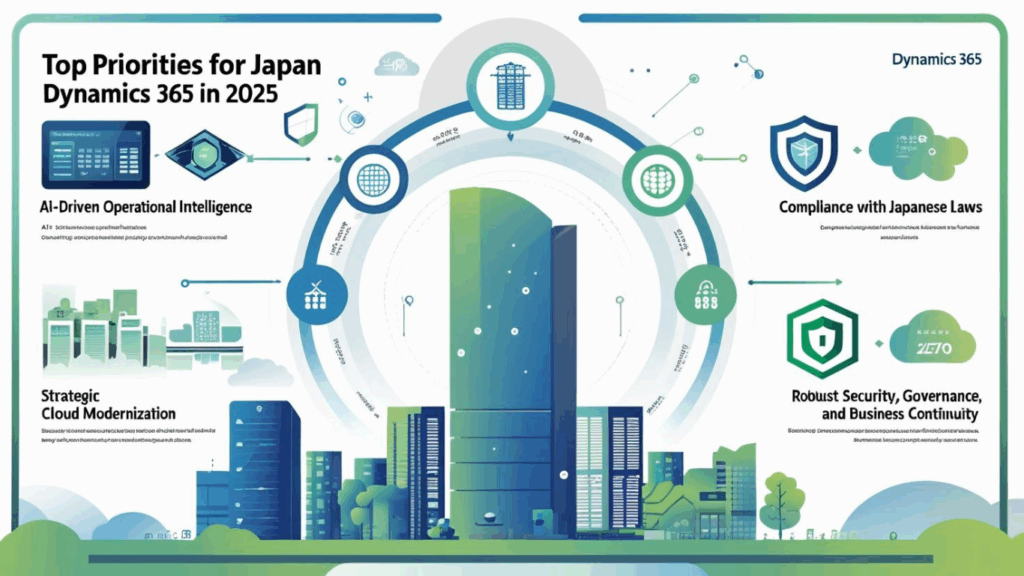
Introduction
As Japanese enterprises enter 2025, CIOs are no longer simply responding to digital disruption — they are actively architecting the future of their organizations. In an era shaped by economic uncertainty, shifting regulations, labor shortages, and relentless innovation in AI, technology leaders in Japan must redefine what enterprise resource planning (ERP) means to the business.
For many, Microsoft Dynamics 365 — particularly Business Central — has become the strategic foundation. But beyond technology, it’s about localization, adaptability, governance, and the role of trusted advisors like Sysamic, a Japan-based Dynamics 365 Partner that understands both the platform and the cultural nuances of Japanese business. This article explores the five most pressing priorities for CIOs in Japan and how Business Central, when deployed intelligently, supports each of them.
From Digital Adoption to Operational Intelligence: In 2024, many CIOs in Japan focused on digitization — replacing paper-based processes and legacy systems. In 2025, the conversation has shifted to operational intelligence. Japanese enterprises now expect their ERP to:
Deliver real-time visibility into financial and operational performance
Provide predictive insights that improve planning
Integrate AI-driven automation for everyday processes
Dynamics 365 Business Central offers built-in analytics, machine learning, and Copilot integration — but true value lies in how it’s configured, localized, and connected to the business context. At Sysamic, we see Japanese CIOs increasingly demand dashboards tailored for local KPIs, consolidated reporting across global and domestic subsidiaries, and cash flow forecasting adapted to Japan’s unique payment cycles and seasonal accounting trends.
Reinventing ERP for Japan’s Regulatory Environment: In Japan, ERP success is measured not just by functionality, but by regulatory precision. The evolving landscape in 2025 includes:
The qualified invoice system (適格請求書等保存方式) introduced under the new consumption tax regime
Stricter electronic book preservation laws (電子帳簿保存法) and audit requirements
Heightened scrutiny on My Number compliance and privacy
Localized payroll, year-end tax adjustments, and industry-specific reporting
CIOs recognize that global ERP systems are not natively built for these requirements. That’s why Sysamic’s approach to Dynamics 365 Japan deployments focuses on compliance as a foundational layer — not a customization afterthought. Our Business Central solutions include localized tax engines, document templates, and regulatory audit workflows embedded from day one.
Strategic Cloud Migration, Not Just Lift-and-Shift: The narrative of “moving to the cloud” has matured. In 2025, Japanese CIOs are pursuing intentional modernization rather than pure migration. This means:
Decommissioning fragmented, siloed applications
Consolidating financial, inventory, and sales processes into a single cloud-native ERP
Building resilience through modular upgrades and elastic infrastructure
Dynamics 365 Business Central, hosted on Microsoft Azure, gives Japanese enterprises a secure and scalable platform — but migration alone is not transformation. At Sysamic, we guide clients through phased rollouts that minimize business disruption. We don’t just “lift and shift” — we rethink workflows, reduce manual workarounds, and ensure that cloud ERP actually improves outcomes. For example, replacing outdated Excel-based consolidation with Business Central’s multi-entity financials saves days of effort and reduces errors — a real benefit in Japan’s lean teams.
Resilience Through Security, Governance, and Business Continuity: Japan’s CIOs are no longer treating cybersecurity and compliance as backend responsibilities. In 2025, these concerns sit at the center of digital strategy, driven by:
Increasingly sophisticated cyber threats
Stricter local and global regulations
The need for data sovereignty and governance across all business systems
Dynamics 365 Japan deployments must meet Japan-specific expectations on data residency, audit logging, and secure access — especially for publicly listed companies and those in finance, manufacturing, and healthcare. Sysamic ensures every deployment is aligned with “security by design” principles. Our implementations of Business Central include role-based access, data classification, and audit readiness features. We also advise on Microsoft’s Zero Trust architecture — not just as a policy, but as a practice embedded in daily operations.
Choosing a Partner That Understands Japan: Technology is only as powerful as its implementation. In Japan, cultural alignment, communication, and local presence often make the difference between success and failure. CIOs now prioritize partners who:
Understand the nuances of Japanese business decision-making
Offer bilingual support to bridge global HQ and local teams
Bring industry knowledge and not just technical expertise
Sysamic is a Japan-based Dynamics 365 Partner — and our role goes beyond implementation. We work as strategic collaborators, helping CIOs align ERP investments with their medium and long-term goals. Whether it’s planning a Business Central rollout across domestic subsidiaries, or integrating ERP with Japan’s unique e-invoicing ecosystem, our team brings both the local grounding and the global mindset required to deliver outcomes.
Conclusion
For Japanese CIOs, 2025 is not about experimenting with new technology — it’s about extracting real, measurable value from investments already made or planned. The shift is from ERP as a system of record to ERP as a platform for insight, agility, and reinvention. Dynamics 365 Business Central offers the capabilities — but it takes a partner like Sysamic to translate those capabilities into meaningful outcomes for Japanese businesses.
If you’re a CIO in Japan looking to redefine your ERP roadmap for 2025 and beyond, it’s time to engage with a partner who not only speaks the language of technology — but also understands the language of Japanese business.
To learn how Sysamic can support your digital transformation in Japan, email us at info@sysamic.com or fill out our contact form here to get in touch.
